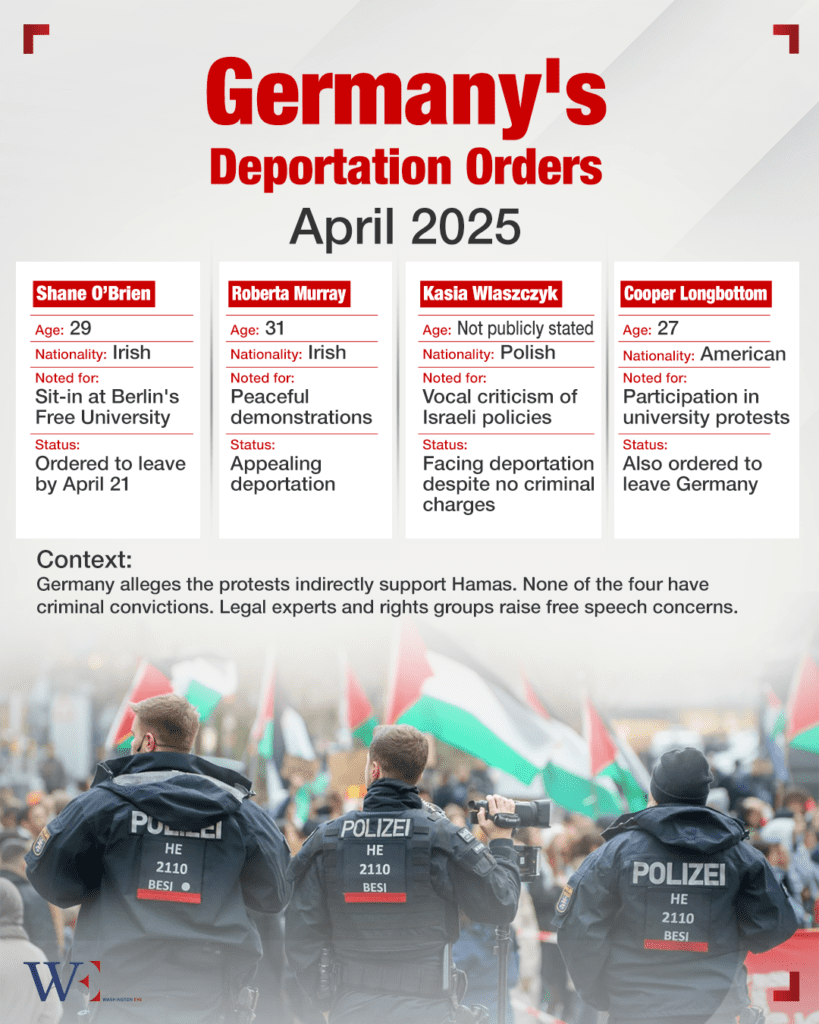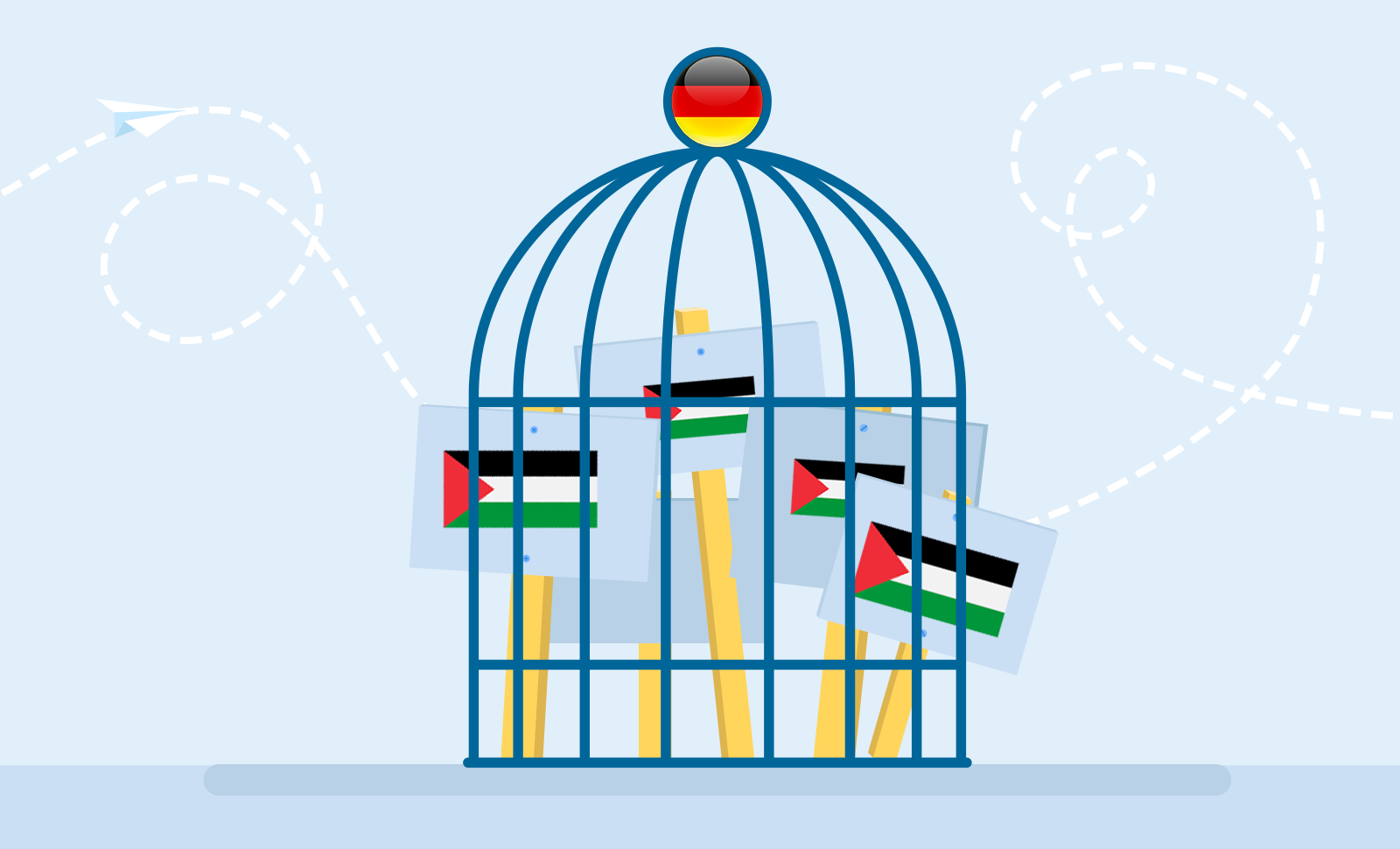Germany has recently intensified its measures against pro-Palestinian activism by initiating the deportation of foreign nationals involved in such activities. This development has sparked significant debate concerning freedom of expression, legal justifications, and the broader political climate in Germany. It’s latest deportation actions against pro-Palestinian activists came to light on April 2, 2025.
Reports emerged indicating that German immigration authorities have ordered several foreign nationals, including European Union (EU) and United States citizens, to leave the country. These individuals are accused of antisemitism and supporting terrorism due to their participation in protests against Israel’s military actions in Gaza. The activists, hailing from countries such as Ireland, Poland, and the United States, contend that the German authorities are weaponizing immigration laws to suppress pro-Palestinian voices. They have appealed the expulsion orders, arguing that the accusations are unfounded and infringe upon their freedom of expression.
The German government’s actions are rooted in a broader legislative framework aimed at combating extremism. In June 2024, the Cabinet approved measures to facilitate the deportation of foreigners who publicly approve of terrorist acts. Under this legislation, even a single comment on social media that glorifies or endorses a terrorist crime can constitute grounds for expulsion. Interior Minister Nancy Faeser emphasized that such online expressions contribute to a climate of violence and that individuals without German citizenship who glorify terrorist acts should be expelled whenever possible.
The Interior Ministry specified that the law on residence would be amended to classify the approval or promotion of a single terrorist crime as grounds for a “particularly serious interest in expulsion.” This means that public approval of an offense, in a manner likely to disturb public peace, could lead to deportation without the necessity of a criminal conviction. However, merely liking a social media post would not suffice for deportation under this law.
Incidents and Enforcement
The enforcement of these measures has led to tangible actions against individuals involved in pro-Palestinian demonstrations. For instance, in Berlin, immigration authorities ordered three EU citizens and one American to leave Germany, citing accusations of antisemitism and support for terrorism following protests against Israel’s offensive in Gaza. The activists argue that these expulsions are an attempt to silence pro-Palestinian voices and have appealed the decisions.
Additionally, pro-Palestinian demonstrations in Berlin have resulted in clashes with law enforcement. In one instance, twelve police officers were injured, one seriously, during protests. The demonstrations, which attracted up to 1,000 participants, were dispersed due to repeated legal violations, including the use of unconstitutional symbols and acts of violence against police officers.
These developments have raised concerns among legal experts and human rights advocates. Critics argue that the German government’s actions may infringe upon freedom of expression and assembly, particularly when individuals are deported without criminal convictions. The use of Germany’s Staatsräson, or state reason to support Israel, as a legal basis for deportation has been questioned for its legitimacy. There is apprehension that equating criticism of Israeli policies with antisemitism could suppress legitimate political dissent and curtail free speech.
Furthermore, the suppression of pro-Palestinian protests is not isolated to Germany. A report by CIVICUS Monitor highlighted a global trend of suppressing Palestinian solidarity protests in both open and restricted societies. The report noted that a significant portion of suppressed protests involved expressions of support for Palestine, with countries like Germany and France implementing measures such as bans and arrests to discourage such demonstrations.
Political Climate and Public Sentiment
The crackdown on pro-Palestinian activism occurs within a broader political context in Germany, where migration and integration are contentious issues. The country has experienced significant demographic changes due to immigration over the past decade, leading to tensions and challenges, including increased crime rates and pressure on social services. These challenges have fueled support for far-right narratives and parties advocating for stricter immigration controls and mass deportations.
The government’s stringent measures against pro-Palestinian activists reflect a delicate balance between maintaining public order and upholding democratic principles, including freedom of expression. As Germany navigates these complex issues, the international community and human rights organizations continue to monitor the situation closely, emphasizing the importance of safeguarding fundamental rights while addressing security concerns.















